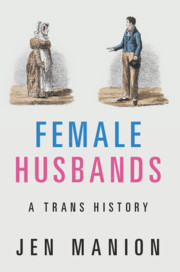Book contents
- Female Husbands
- Female Husbands
- Copyright page
- Dedication
- Contents
- Acknowledgments
- Introduction: Extraordinary Lives
- Part One UK Husbands, 1740–1840
- Part Two US Husbands, 1830–1910
- 5 The Workers
- 6 The Activists
- 7 The Criminalized Poor
- 8 The End of a Category
- Conclusion: Sex Trumps Gender
- Epilogue: The First Female-to-Male Transsexual
- Notes
- Index
5 - The Workers
from Part Two - US Husbands, 1830–1910
Published online by Cambridge University Press: 28 February 2020
- Female Husbands
- Female Husbands
- Copyright page
- Dedication
- Contents
- Acknowledgments
- Introduction: Extraordinary Lives
- Part One UK Husbands, 1740–1840
- Part Two US Husbands, 1830–1910
- 5 The Workers
- 6 The Activists
- 7 The Criminalized Poor
- 8 The End of a Category
- Conclusion: Sex Trumps Gender
- Epilogue: The First Female-to-Male Transsexual
- Notes
- Index
Summary
The lives of people presenting themselves as white men to travel, work, and live in antebellum America were given meaning through several important national discourses, from the low wages paid to free working women to the extensive restrictions placed on African Americans – enslaved and free. Much was made about the efforts of white people presenting themselves as men to secure work that only men were hired to do. They could be found anywhere from the most metropolitan cities to obscure rural outposts, on ships, in factories, or simply walking through town. The existence of this unique group sparked commentary on a host of issues large and small, from theories of economic transformation and the changing workforce to detailed descriptions of the clothing they wore. Each reported incident of a woman wearing male attire and working as a man affirmed what many already knew: when given the chance, those assigned female at birth could easily do the work that was reserved for men. But for the discerning reader, it said something far more significant: the distinction between male and female was not that great and could largely be overcome by those who wanted to embrace a social gender typically reserved for those assigned a different sex.
- Type
- Chapter
- Information
- Female HusbandsA Trans History, pp. 139 - 164Publisher: Cambridge University PressPrint publication year: 2020



